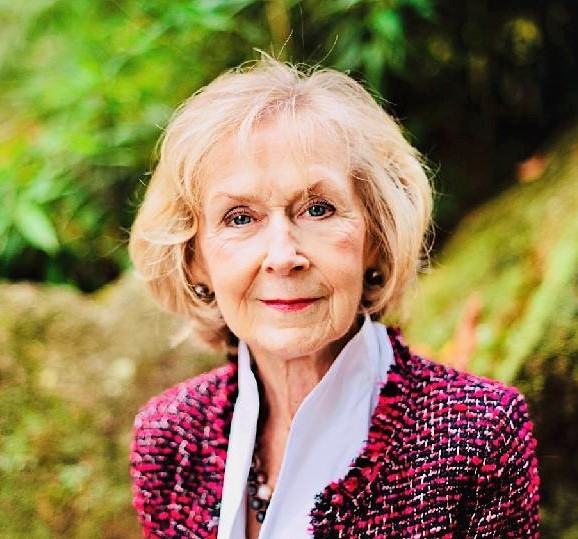
My mother’s name was called, and we left the waiting room to approach the hospital desk to complete paperwork for her outpatient procedure. The clerk immediately began to ask me questions. “What is her full name? What is her address?” Embarrassed for the admittance clerk and my mother, I suggested, “Why don’t you ask her?”
Now, I’m my mother’s age at that visit, and the same thing is happening to me, but why? Age discrimination? Youth-driven culture? One might think America’s obsession with youth is in part responsible, but I have found the “invisible effect” that accompanies aging more universal than one point in time or place.
My age-related non-status was particularly apparent on a recent vacation with my daughter. At hotels standing side-by-side with my daughter, the desk attendants asked her how they could help, though I had made the reservation and was paying for the rooms. The biggest insult was the day that the server took her lunch order, asked if that was all (for her, she thought, responding yes) and walked away without taking my order. I am petite but not invisible.
Acknowledging the presence and autonomy of others is a means of showing respect. As a key ethical value, respect means recognizing and valuing others regardless of age or ability. Customer service — whether you’re in government, healthcare, food service or retail — means focusing on the individual and that person’s needs or wants. Looking at the person, addressing and listening to the person who is the real customer, and responding to that person’s needs and wishes are essential elements of showing respect.
These ethical lessons are vital for those who work in long-term care. I remember walking into a facility where a resident told me that she and her husband had been married 62 years before his death. I stopped to talk to her and hear about this achievement. One of the staff members commented to me that “she tells everybody who walks in the door the same thing,” discounting the need to listen. The resident just needed attention and affirmation that is often lacking in the lives of elders.
It’s not same-old, same-old for residents
Nursing home staff are admittedly often pressed because of time constraints, sometimes from the first day in the facility. The admissions staff want to get the paperwork completed, sometimes running roughshod over the person’s autonomy, failing to identify or acknowledge important issues like resident hobbies and food preferences and preferred schedules.
It’s same-old, same-old for the staff, but it is a new and likely frightening time for the potential resident. Comprehending this can change the dynamic of these meetings. Even slowing down the process to allow for conversation can demonstrate caring and interest, aspects of respect.
Understanding the potential resident’s desire for communications is also vital. There are, of course, circumstances when the person is unable to answer questions either because of physical or mental impairments, but even in these situations, providing alternative communications opportunities is vital to ensure a successful relationship between the resident and facility staff.
An expression long used in disability rights is particularly apropos for the way we should treat each resident: “Nothing about us without us.” Working with the desires and abilities of residents helps them retain their autonomy and personhood. They can be empowered.
Initial visits to facilities are often fraught with misunderstandings when administrative staff are still receiving calls or someone is knocking at the door during the interview. That lack of focus can make the new resident feel less important and even defensive about not being “seen” or heard. Getting off on the right foot by recognizing and acknowledging the person’s history and interests can help ease the resident into a happier stay. When the “responsible party” is doing the talking, the resident feels like excess baggage, further isolating him or her through the process.
I once had a social worker/admissions director friend who brought out a silver tea set for the participants in the initial interview process. She served tea or coffee and made the person feel welcome and comfortable, taking the time needed to do her job right. She packaged resident essentials (soap, basin, and other personal supplies) in cellophane with a bow, sort of a welcome gift to the facility.
She showed respect and it followed throughout the residents’ stays in the facility. These were her efforts to make each person involved in the transition to the facility feel special and heard, while demonstrating for the entire staff the way a person should be treated.
Being in a nursing facility might well be the right and best place to be at any specific time, but it is seldom anyone’s first choice. Aging brings many losses without losing one’s autonomy. Keeping the focus on the fact that the person is an individual helps keep us on track to achieve the results we want: maximizing and enhancing life experiences for our residents.
Like doctors and nurses in emergency departments who sometimes get inured to pain and suffering, long-term care staff can become complacent when it comes to individuals and their rights as human beings. They are worthy of notice, no matter age or status. Inculcating the culture with respect for others can create a happier workplace for residents and staff alike and is key to achieving a more ethical workplace.
Mary Eleanor Wickersham, M.A., D.P.A., is associate professor emerita of public affairs at the College of Coastal Georgia. Prior to her teaching career, she worked in all aspects of long-term care.



